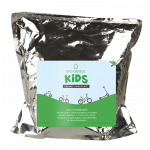Stomach pains in children is one of the most common complaints of children. Identifying the pain can be hard. There are so many things that can cause stomach pain that sometimes coming to the conclusion of what the culprit is can be exhausting and frustrating.Â
Stomach pains can be caused by constipation, diarrhea, overeating, allergies, stress, or gas. Gas is common in children of all ages. Gas bothers some people more than others just as some people produce more gas than others.Â
Â
Symptoms
Gas pains can cause extra fussiness in children. Children complaining of stomach pains over half their belly is usually a sign of gas pains, as well as cramping and bloating. Gas pains can sometimes be followed by diarrhea. Symptoms can either be mild, or severe depending on how much excess gas the child has backed up. Â
Read more:Â Abdominal Bloating Causes, Symptoms, and Treatments – What to DoÂ
Causes
There are a lot of causes of gas. The main one being diet. There are a lot of foods that can cause excess gas. Foods that can cause excess gas are spicy foods, beans, citrus, caffeine, fried or fatty foods, beans, artichokes, asparagus, broccoli, Brussel sprouts, cabbage, cauliflower, green peppers, onions, peas, radishes, raw potatoes, apricots, bananas, melons, peaches, pears, prunes, raw apples, or wheat or wheat bran.Â
Carbonated beverages or drinking through a straw can also cause gas, so can swallowing too much air which can happen by chewing gum.Â
Antibiotics, constipations, being lactose intolerant, celiac disease, irritable bowel syndrome, or gastroenteritis can all have the side effect of gas. Â
Treatment
Excess gas doesn’t usually need medical attention. There are some things you can do at home to help ease your child’s pain.Â
For small babies that are experiencing gas pains you can adjust your feedings. Make sure you aren’t overfeeding, hold them upright, and burp often.Â
Other things you can do for infants are rock the baby gently, move legs in a bicycle motion, or stomach massage. Adjusting the baby’s position by laying them across your lap and pat their back can also help relieve pains.Â
A warm towel or warm water bottle across the baby’s belly can also help.Â
Speak to your pediatrician about switching formulas if you are formula feeding. There are soy formulas, or sensitive formulas you can switch to to help decrease excess gas. If you are breastfeeding you do not need to change your diet, there is no knowledge of the mother’s diet causing excess gas in a baby. Â
There are also more remedies for older children. You can add probiotics to your child’s diet. This can be from yogurt or soy beverages. Too much probiotics though can be counteractive so make sure you speak with your pediatrician before overdoing it on the probiotics.Â
Changes in your diet can be helpful. Decreasing the foods that can cause gas.Â
No chewing gum, drinking through a straw, or gulping food. All of these can cause you to swallow too much air, which can lead to gas build up.Â
If your child is lactose intolerant, stay away from dairy products.Â
Eliminating artificial sweeteners and fizzy drinks can also help.Â
Help your child by having them lie down and rest when the pain starts.Â
Taking small sips of water can help settle the gas. Â
Read More: Passing Gas And Belching And Your Health
Signs To See A Health Professional
There is a time though when stomach pain is serious and you should call your pediatrician.Â
If you notice that the pain happens frequently contact your pediatrician. They may suggest your right down everything your child is eating in a food diary, and when they have stomach pains.Â
If your child has severe pain on the right side of their stomach that is constant, you will want to call your pediatrician, this could be a sign of appendicitis.Â
Severe pain that lasts over an hour should also be called into your doctor.Â
Other reasons to call your doctor would be constant pain lasting over two hours, fever and vomiting, blood in the stool, younger than twelve months of age, if your child is losing weight, or if their abdomen is sticking out.Â
If you think the pain isn’t normal call your pediatrician.
Final Thoughts
Gas pains and gas buildup in children is extremely common. Stomach pains are one of the main complaints of children.Â
After realizing what foods trigger your child’s excess gas eliminating it usually can be done without medical attention. Changes in diet is usually the first place to start when fixing.Â
To ease the pain you can always use a warm compress.Â
Ibuprofen can be used if suggested by your pediatrician, over the counter meds can sometimes make stomach pains worse.Â
Gas is normal though it bothers more than others small changes can help the stomach pains. Having an underlying condition can also cause gas, getting those treated can help with eliminating the gas pains as well. Making sure your child knows that gas is normal and trying to not hold the gas in can also alleviate pains. Â
Child complaining their stomach hurts? Is it gas pain? Learn more here! #HealthStatus
Product Recommendation:Â Purium Aloe Digest – Stop stomach pain in its tracks.
There is no scientific evidence that a breast feeding Mother’s diet can cause an infant excess gas.
Sources:
https://www.scripps.org/news_items/6821-stomach-pain-in-kids-and-teens#:~:text=Gas%20pain%20or%20indigestion%20is,including%20chocolate)%20may%20cause%20gas
https://medlineplus.gov/ency/article/007504.htm
https://www.webmd.com/first-aid/gas-pain-children
https://myhealth.alberta.ca/Health/aftercareinformation/pages/conditions.aspx?hwid=bz1073
https://www.aboutkidshealth.ca/article?contentid=822&language=english









Reply